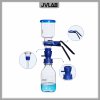Hi all,
Did my first homebrew(experiment) yesterday and all went well. However, still some questions about sterilization.
I am using a simple 4L pressure cooker from amazon with max 13psi. I've seen some scientific literature and people on mushroom forums say that 15psi is not needed per se, but a lower psi will be sufficient for sterilization. It just needs to run for a longer amount of time.
However, this recommendation was not for laboratory glassware but for glucocorticosteroids. I can not find any other literature on it.
Still based on this, I think 30 to 40 minutes should be suffucient for 13psi and also based on all the other information I've seen.
Anyone else using a simple pressure cooker as an autoclave? How long do you run it?
Does anyone use an airfryer to dry afterwards?
(For drying, since I don't have an oven, I do put everything in the airfryer, still slightly covered with aluminium foil.)
Did my first homebrew(experiment) yesterday and all went well. However, still some questions about sterilization.
I am using a simple 4L pressure cooker from amazon with max 13psi. I've seen some scientific literature and people on mushroom forums say that 15psi is not needed per se, but a lower psi will be sufficient for sterilization. It just needs to run for a longer amount of time.
"The sterilization is preferably done at temperatures ranging from 100-140°C for 3-30 mins at varying pressures. Preferred combinations of temperature- time-pressure including the following:
121°C for 20 mins at 103 kPa (15 psi)
132°C for 3 mins at 186 kPa (27 psi)
115°C for 30 mins at 69 kPa (10 psi)
But other combinations can be used if desired. Generally, the higher the temperature and pressure, the shorter the time required for adequate sterilization."
However, this recommendation was not for laboratory glassware but for glucocorticosteroids. I can not find any other literature on it.
Still based on this, I think 30 to 40 minutes should be suffucient for 13psi and also based on all the other information I've seen.
Anyone else using a simple pressure cooker as an autoclave? How long do you run it?
Does anyone use an airfryer to dry afterwards?
(For drying, since I don't have an oven, I do put everything in the airfryer, still slightly covered with aluminium foil.)


